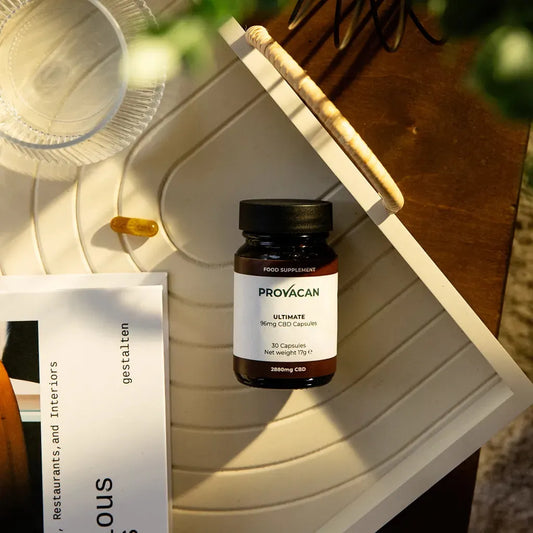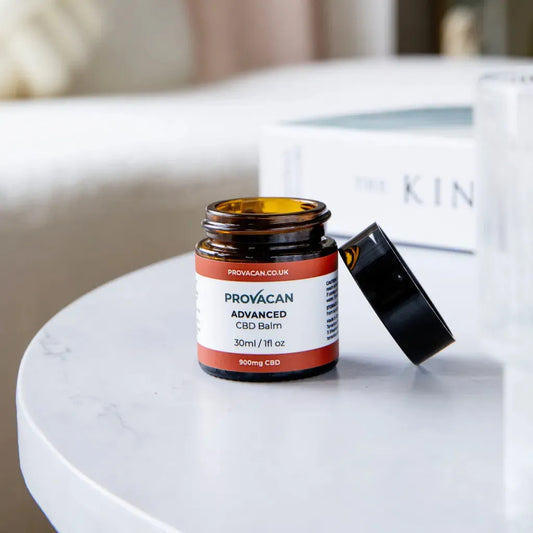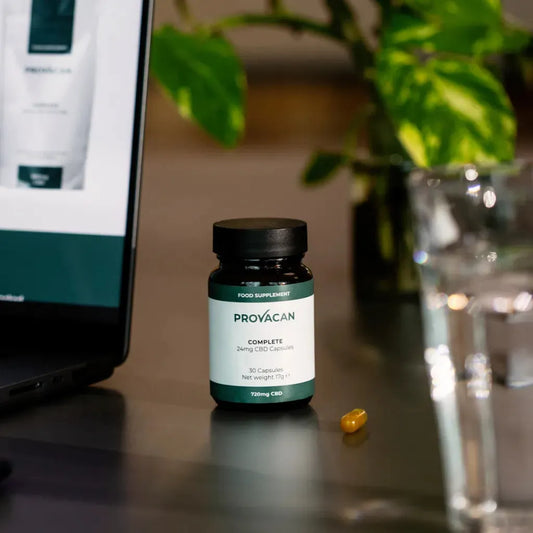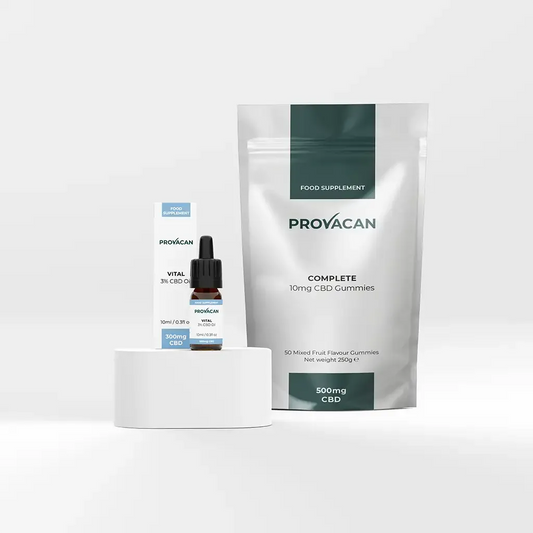Key Takeaways:
- CBD And Halal compliance: CBD's non-intoxicating properties and extraction method play crucial roles in determining its permissibility under Islamic dietary laws.
- Intoxicants In Islam: CBD does not impair cognitive function and can be permissible when used for medicinal purposes, aligning with Islamic principles against intoxication.
- Importance Of Quality And Purity: Selecting a trusted brand like Provacan, which adheres to high purity and potency standards, is essential for those observing a Halal lifestyle.
It’s real.
Cannabidiol (CBD) has gained extensive popularity for its numerous health benefits in recent years, sparking significant debate, especially among people who adhere to Halal dietary laws. As CBD continues to make its way into wellness products worldwide, many are left wondering whether CBD is Halal – since Muslim consumers want to maintain a Halal lifestyle while exploring the benefits CBD has to offer.
This article aims to elucidate the considerations surrounding CBD's Halal status, guided by substantiated claims and halal-compliant practices in CBD production, to empower you with knowledge and confidence in your wellness choices.
Understanding Islamic Dietary Laws
Islamic dietary laws (also called halal regulations) form an integral part of Islamic religion and culture. The principles behind Muslim dietary laws are focused on ensuring ethical consumption under their faith, caring for one’s health, and maintaining a sense of spiritual purity.
At the core of halal food guidelines is the category of purity and wholesomeness. Halal foods are considered clean, beneficial to health, and respectful of Islamic ethical standards. For meat to qualify as halal, specific humane slaughtering practices must be followed, and the name of the Muslim God must be invoked during the process. This method of slaughter is known as zabiha.
Prohibited foods, or those deemed haram, include alcohol, pork, and its by-products, animals that die of themselves (carrion), and any food contaminated with these or other haram substances. The prohibition against intoxicating substances is of particular importance, as they are considered harmful to both spiritual and physical well-being, thus contradicting the very principles of halal.
For a Muslim consumer of modern goods, finding products that comply with these dietary laws has been streamlined through certification. Halal certificates issued by recognised authorities assure consumers that the foods they purchase meet the strict standards of Islamic law. As the demand for halal products rises globally, more companies are seeking these certifications to cater to the needs of the Muslim community.
Is CBD Halal?
It depends. The first factor is the source of the CBD. CBD derived from hemp, a variety of cannabis with very low levels of THC, is generally considered halal. This is because hemp is a plant that has been historically used for various purposes and does not produce intoxicating effects.
Another critical consideration is the method of extraction. For CBD to be halal, it must be extracted using permissible methods. Solvents like alcohol are often used in the extraction process, but if the alcohol is of a type not permissible in Islam or if it remains in the final product, this could render the CBD haram (forbidden). However, there are extraction methods like CO2 extraction that don’t involve alcohol and are, therefore, more likely to be considered halal.
The third consideration is the presence of THC. For a product to be considered halal, it must not cause intoxication. Since THC is the compound responsible for the psychoactive effects of cannabis, products containing THC above a certain threshold may not be considered halal. Fortunately, many CBD products, especially those derived from hemp, contain minimal to no THC.
Halal Certification and CBD Products
Look for halal certification to ensure that CBD products are halal. It indicates that the product was reviewed and meets the requirements set by Islamic law. Some CBD brands have already sought halal certification to cater to the Muslim market, providing peace of mind to consumers.
The Benefits Of CBD
The benefits of CBD are wide-ranging and have been supported by both anecdotal evidence and scientific research. Here are some of the key benefits:
- Anxiety: CBD is widely used for its potential calming effects. While more research is needed, it may have relevant use here.
- Improved Sleep: CBD may promote relaxation and reduce anxiety, improving sleep quality, and helping those who struggle with insomnia or restless nights.
- Support For Mental Health: CBD is also being studied for its potential to help with depression and other mental health conditions.
- Skin Health: Topical CBD products are becoming popular for their ability to soothe skin conditions like acne, psoriasis, and eczema.
- Neuroprotective Effects: CBD’s potential to protect the nervous system and its role in managing neurological disorders are promising areas of ongoing research.
- Anti-Seizure Properties: CBD is a key ingredient in Epidiolex, an FDA-approved medication for certain types of epilepsy, highlighting its effectiveness in controlling seizures.
Provacan's Range Of CBD Products
Provacan is a leading name in the CBD industry and offers high-quality CBD products. Each product is crafted with care, ensuring that consumers receive the best that CBD has to offer.
Provacan’s products are derived from hemp, which is grown under strict conditions to ensure purity and safety. The brand uses CO2 extraction methods, which do not involve alcohol, making their CBD products more likely to be considered halal. Moreover, Provacan’s products are tested by third-party labs to verify their content, including ensuring that THC levels are within legal and safe limits.
Here’s an overview of Provacan’s popular products:
- CBD Oil: Available in various strengths, these oil drops are easy to use and can be added to food or taken sublingually. They are made using full-spectrum hemp extract, which contains a range of beneficial cannabinoids without the risk of intoxication.
- CBD Capsules: These offer a convenient way to consume CBD, with each capsule containing a precise dose. They are ideal for those who prefer not to use oil drops.
- CBD Topicals: Provacan offers a selection of balms designed for targeted relief and is popular among those dealing with joint and muscle issues.
- CBD Gummies: These tasty treats are an easy and enjoyable way to take CBD. Provacan’s gummies are made with natural ingredients and are free from artificial flavours and colours.
Ensuring Halal Compliance
While Provacan has not yet obtained halal certification for its products, the company’s practices suggest that its CBD products may align with halal principles. Consumers interested in ensuring that their CBD is halal should seek products with halal certification or consult with knowledgeable religious authorities.
Final Thoughts
Determining whether CBD is halal involves a nuanced understanding of its sourcing, production processes, and the principles of Islamic law. Given that CBD does not intoxicate and is derived from natural sources, it aligns with the basic requirements to be considered halal, provided it is free from haram (forbidden) substances and alcohol contamination during its extraction and manufacturing.
If you’re conscious of wellness or adhering to a halal lifestyle, choosing a trusted brand like Provacan is crucial. With our commitment to unmatched quality, Provacan ensures that every CBD product we offer meets the highest purity and potency standards, leaning on scientific research and precise extraction methods. Our dedication to customer well-being and stringent quality benchmarks make our offerings suitable for those seeking halal-certified products.
Read also:
Frequently Asked Questions On CBD Being Halal
Is CBD Halal?
CBD itself is halal, as it is a naturally occurring compound found in hemp plants and does not possess any psychoactive properties that alter one’s state of mind. However, the halal status of CBD products depends on other ingredients and the extraction process used. Products must be free from alcohol and other haram substances to be considered halal.
What is CBD?
CBD, or cannabidiol, is one of over a hundred compounds known as cannabinoids found in cannabis plants. Unlike THC (tetrahydrocannabinol), CBD is non-psychoactive, meaning it doesn’t cause the “high” associated with cannabis use. It's widely used for its potential therapeutic benefits.
Does CBD Contain Intoxicating Properties?
No, CBD is non-intoxicating and does not alter a user’s state of consciousness. THC is the cannabis compound responsible for psychoactive effects, while CBD is used for its potential wellness benefits without causing impairment.
Are All CBD Products Considered Halal?
Not necessarily. While the CBD compound itself is considered halal, the halal status of a CBD product also depends on its other ingredients and the method of extraction. For example, CBD oils must be extracted without the use of alcohol and contain no haram substances to be deemed halal.
How is CBD Extracted?
CBD can be extracted from cannabis plants using several methods, including carbon dioxide extraction, ethanol extraction, or hydrocarbon extraction. For a product to be considered halal, methods that do not involve alcohol or ensure its complete removal during the extraction process are preferred.
Can CBD be Used in Medicine in Islamic Practice?
Yes, if CBD is prescribed for medicinal purposes and does not contain any haram substances, it’s permissible for Muslims to use. Islamic law permits the use of substances that contribute to health and well-being, provided they do not harm the body.
What is the Islamic Stance on Using Intoxicants?
Islam prohibits the use of intoxicants that impair one’s judgement or alter the mind. Since CBD does not have psychoactive effects, it does not fall into the category of intoxicants banned in Islam.
Is CBD Addictive?
Research shows that CBD does not have addictive properties. Unlike THC and other psychoactive substances, CBD has been found to have a low risk of dependence.
Does the Source of CBD Matter for It to Be Halal?
Yes, the source of CBD is important in determining its halal status. CBD derived from industrial hemp (cannabis plants with low THC content) is acceptable, while CBD from other sources with high THC levels might not be permissible.
Can CBD be Consumed by Muslims for Health Benefits?
Muslims can consume CBD for health benefits if the product is halal-certified, ensuring it is free from haram substances and produced via a halal-compliant process. As always, consulting with a healthcare provider and a knowledgeable Islamic scholar is advisable before starting any new health products.
Sources:
- CBD ONE. (n.d.). Is CBD Oil Halal? Your Questions Answered. Retrieved September 9, 2024, from https://cbd-one.co.uk/blog/is-cbd-oil-halal/
- Hemptations CBD. (n.d.). Is CBD Halal? Everything You Need to Know. Retrieved September 9, 2024, from https://www.hemptations-cbd.com/blog/is-cbd-halal/
- GreenGuide. (2024). Halal CBD products: A Muslim’s perspective and compliance. Retrieved from https://www.greenguide.me/halal-cbd-products/
- Doze CBD. (2024). Is CBD oil halal? UK’s guide for conscious consumers. Retrieved from https://www.dozecbd.co.uk/is-cbd-oil-halal/


























